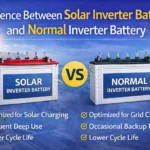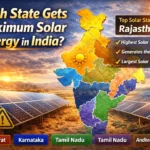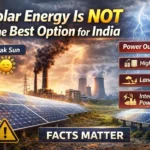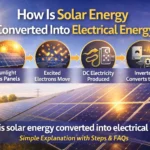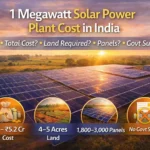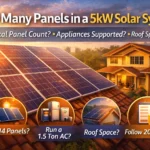Why Solar Energy Is a Smart Choice Today
Anúncios
Solar energy is growing fast in the USA. More people want clean, cheap electricity. But installing solar panels can be expensive. Many homeowners worry about how to pay for their solar system. They also wonder how to protect it from damage or theft.
This article will explain the best ways to get solar energy insurance coverage and loan solutions in the USA for 2025. I will guide you through the types of loans you can get, how solar insurance works, and why these choices matter. If you are from India or anywhere, this guide will help you understand the American solar market and how to benefit.
Understanding Solar Energy Loans: Making Solar Affordable
Solar panels have an upfront cost. This can be a barrier for many people. Loans help spread out this cost over years. Solar loans pay for the system, and you repay the money in small monthly amounts.
Types of Solar Loans Available
- Unsecured Solar Loans: No collateral needed, quick approval. Higher interest rates.
- Secured Solar Loans: Home or property as collateral. Lower interest but higher risk.
- Home Equity Loans or HELOC: Use home’s equity. Lowest interest but longer approval.
- In-House Solar Loans: Offered by some solar companies.
- Government and Municipal Loans: Special loans with low-interest rates or rebates.
Anúncios
Each type has pros and cons. Choose one based on your credit score, financial comfort, and loan amount.
Why Take a Solar Loan Now? The Benefits
- Save on Electricity Bills: Solar panels reduce power purchase from the grid.
- Federal Tax Credits: In 2025, the US government offers a 30% solar tax credit for systems installed by December 31.
- Increase Home Value: Solar panels make homes attractive and eco-friendly.
- Flexible Payment Plans: Loans from 5 to 20 years make monthly costs manageable.
- No or Low Down Payment: Many lenders offer loans with zero upfront payments.
Top Solar Loan Providers in the USA (2025)
Here are some trusted lenders for solar loans:
- LightStream: Offers low-interest loans with no fees, up to $100,000.
- Sunlight Financial: Known for zero to low-interest loans and 20-year terms.
- GoodLeap: Provides fixed-rate loans for solar and energy upgrades.
- LendingClub: Flexible personal loans for solar financing.
- Local Credit Unions: Often have the best rates and support.
Solar Energy Insurance: Protecting Your Investment
Solar panels cost between $15,000 and $30,000 on average in the USA. This is a big investment. Like other home parts, solar systems need protection from damage.
What Does Solar Insurance Cover?
- Damage from storms, hail, wind, or fire.
- Theft or vandalism.
- Equipment failures or breakdowns.
- Liability in case of accidents involving panels.
How Is Solar Insurance Provided?
- Most rooftop panels are covered by homeowners’ insurance.
- Some insurers treat solar as part of the home, others as “other structures” with smaller limits.
- Ground-mounted panels or solar carports may require a separate policy.
- You might need to increase your home insurance coverage to include solar panel value.
Does Solar Raise Your Home Insurance Cost?
Only if your total home replacement value changes enough to need higher coverage. This can increase premiums by as little as $15 a month.
Anúncios
How to Get the Best Solar Insurance
- Talk to your home insurer: Check if your solar panels are already covered.
- Increase your coverage if needed: To protect against full replacement costs.
- Consider specialized solar insurance: For bigger installations or ground systems.
- Use companies with solar expertise: Solar Insure and Sunhub lead this space.
Claims Process for Solar Insurance
If your panels are damaged:
- Document the damage with photos.
- Contact your insurer quickly.
- Provide all information and paperwork.
- Use licensed contractors for repair estimates.
- Stay in touch with your insurance adjuster during the claim process.
Government Programs and Incentives
The US government wants more solar energy use. So, it offers programs like:
Federal Solar Tax Credit
- 30% of the system cost returned as a tax credit.
- Valid only for systems installed before December 31, 2025.
State and Local Incentives
Check your local government website or DSIRE database (dsireusa.org) for:
- Rebates
- Low-interest loans
- Grants for low-income families
- Net metering policies (credit for excess solar power sent to grid)
Tips for Indian Readers Interested in US Solar
If you or your family live in the USA or want to invest there, consider this:
- Always check credit requirements and loan terms.
- Many loans don’t require a large credit history.
- Make sure you get insurance quotes after installation.
- Use trusted solar companies known for fair financing.
- Act quickly before the federal tax credit expires.
Popular Solar Companies with Loan & Insurance Options (2025)
| Company | Products & Services | Warranty | Highlights |
|---|---|---|---|
| Sunrun | Buy, lease, PPA options | 25 years | One of the largest networks |
| Palmetto | Installation & protection | 20 years | Strong customer support |
| Momentum Solar | Custom packages | 15 years | Flexible loans and insurance |
| Tesla Energy | Panels & Powerwalls | 20 years | Advanced technology and storage |
These companies often offer bundled loan and insurance solutions. They make the entire process easier.
Glossary: Important Terms to Know
- PPA: Power Purchase Agreement; lease solar panels instead of owning them.
- HELOC: Home Equity Line of Credit; a loan based on home equity.
- Net Metering: Getting credit for extra electricity your solar produces.
- Tax Credit: Money the government gives back to reduce costs.
- Unsecured Loan: Loan without collateral.
- Secured Loan: Loan backed by collateral.
FAQs About USA Solar Energy Insurance and Loans (2025)
1. Are solar panels covered by standard home insurance?
Usually yes, if they are rooftop panels. Check your policy to confirm details. Coverage depends on your insurer’s classification of solar panels.
2. What types of solar loans are best for homeowners?
Unsecured loans are quick and simple, but secured loans and HELOC offer lower rates if you have good credit or home equity.
3. Can I get solar loans with bad credit?
Some lenders are flexible, but interest rates may be high. PACE loans (tied to property) are less credit-dependent in many states.
4. How to claim insurance if solar panels are damaged?
Take photos, contact your insurer fast, submit documents, use certified contractors. Stay in touch with adjusters for updates.
5. What happens when the federal solar tax credit ends?
Install before December 31, 2025, to get the 30% credit. After that, the credit mostly ends, increasing upfront costs.
Conclusion: Take Control with Loans and Insurance
Solar energy is a smart investment. But it needs proper financing and protection. The best solar energy insurance coverage and loan solutions in the USA make solar easy and affordable. Don’t wait for electricity prices to rise more or for incentives to expire.
Explore your loan options. Check your insurance. Use government programs to save more. This is your chance to own clean energy, save money, and help the planet.
If you are from India or anywhere, this guide helps you understand US solar choices clearly. Share this article if it helps or ask questions below. Together, let’s power the future with solar energy!



